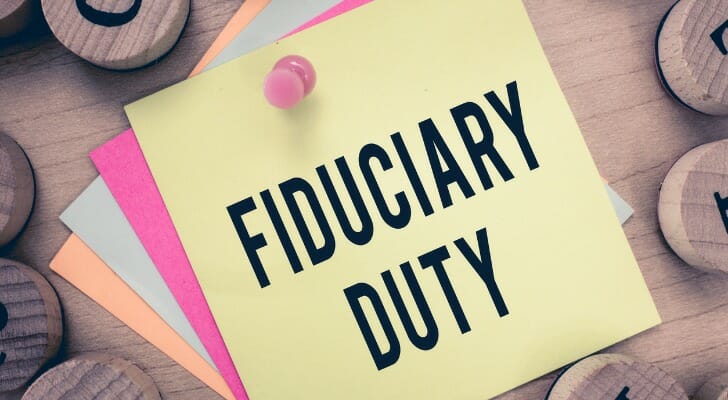When you go to a doctor, you may prefer one who puts your health first. When it comes to your money, you likely want a professional with your interests in mind. An Accredited Investment Fiduciary Analyst (AIFA) can work in your best interests. Here’s how people get that title and how they work for you.
Accredited Investment Fiduciary Analyst Defined
Being a fiduciary is already a big responsibility. As money management grows, demand for higher qualified individuals does as well. This includes fiduciary financial advisors.
An Accredited Investment Fiduciary Analyst (AIFA) is an investment professional with an extra level of education and expertise to give clients fiduciary advice. An AIFA designation is offered by the Center for Fiduciary Studies to assess and perform fiduciary policies.
Before getting an AIFA designation, professionals need to complete the necessary AIF coursework. Advisors who complete the AIF training and earn the designation are able to move onto earning the AIFA designation. This allows advisors to perform fiduciary assessments for individuals, companies, nonprofits, and other entities.
It’s one of the highest levels of certification standards compared to other financial specialists. It gives the designee the ability to certify an organization with a “fiduciary standard of excellence.” It means the holder has one of the highest levels of expertise in the industry.
Why Should I Use an AIFA?
 Fiduciary duty constitutes the highest standard of care required by law. For financial advisors, it it means you serve the best interests of your client above all else.
Fiduciary duty constitutes the highest standard of care required by law. For financial advisors, it it means you serve the best interests of your client above all else.
Jobs that require fiduciary duty usually require a high degree of specified knowledge. As a result, the average person typically can’t understand or refute the advice offered by such professionals. Consequently, those professionals could inflict great harm on clients by acting in their own interests.
When thinking about who should handle your money, it’s important to find someone who has a solid level of expertise. An AIFA designation:
- Shows high standards: When companies and organizations use an AIFA, they are showing their investors, donors and even employees that they take money management seriously.
- Stands out in a crowd: With many different financial designations, an AIFA is like a master’s degree. The expert level that comes with the designation means you’re using a credible person in an otherwise competitive space.
- Increased fiduciary ranking: The designation doesn’t just bring more financial knowledge, but a higher level of fiduciary standing.
While it’s easy to use anyone that says they have a certain level of financial expertise, it’s best to do your research and see which certifications they have. See what each certification means and determine if this person is good enough to work with.
AIFA Certification and Designation Procedure
Before someone earns an AIFA designation, they must become an Accredited Investment Fiduciary (AIF).
The AIF designation allows financial professionals to learn and become equipped with tools to help business professionals and others grow. You’ll learn the standards of fiduciary responsibility, organizing a client for success and how to form an investment strategy. After that, you’ll learn how to implement that strategy, handle due diligence, and oversee results.
By achieving the AIF designation, you’re qualified to train for the AIFA designation. The Accredited Investment Fiduciary Analyst is a higher program over AIF, where an analyst is certified to handle fiduciary assessments and to verify a client for “Global Fiduciary Standard of Excellence.”
To earn the designation, you’ll need to participate in a three-day training program of group and independent assignments. The program includes:
- Learning the Global Fiduciary Standard of Excellence and Leadership Quotient.
- Understanding legal issues and regulatory oversight.
- Gaining knowledge of Global Fiduciary Precepts and Fiduciary Quality Management System.
- Learning about the International Organization for Standardization.
- Handling assessments.
The cost of the training is $2,350.
The Bottom Line
 A fiduciary holds one of the highest levels of credibility in the investment world. Thus, working with someone who has an AIFA designation can offer you the services of highly skilled and experienced professional. This isn’t just someone who knows how to handle money. They can give you some of the best advice most relevant to your individual situation and formulate a strategy with your best interests in mind.
A fiduciary holds one of the highest levels of credibility in the investment world. Thus, working with someone who has an AIFA designation can offer you the services of highly skilled and experienced professional. This isn’t just someone who knows how to handle money. They can give you some of the best advice most relevant to your individual situation and formulate a strategy with your best interests in mind.
Companies and organizations might benefit most from using someone with an AIFA designation. However, individual investors may want someone looking out for them rather than a company’s bottom line.
Financial Advisor Tips
- Having trouble finding an AIFA? Finding the right financial advisor that fits your needs doesn’t have to be hard. SmartAsset’s free tool matches you with financial advisors in your area in 5 minutes. If you’re ready to be matched with local advisors that will help you achieve your financial goals, get started now.
- It’s OK if you don’t get matched up with an AIFA. But doing your due diligence and vetting the professionals you find is very important. Check their credentials and if see if they are certified in whatever they say they are. For example, SmartAsset has a guide to finding a financial advisor you can trust. It’s better to do your homework early and often instead of getting duped and possibly losing money in the long run.
Photo credit: ©iStock.com/Wavebreakmedia, ©iStock.com/Worawee Meepian, ©iStock.com/Artur
